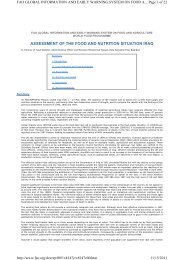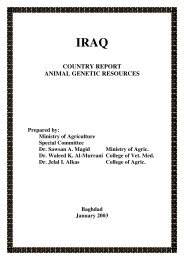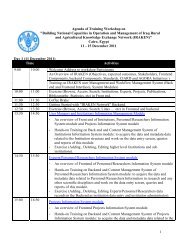Vermiculture in Egypt: - FAO - Regional Office for the Near East and
Vermiculture in Egypt: - FAO - Regional Office for the Near East and
Vermiculture in Egypt: - FAO - Regional Office for the Near East and
Create successful ePaper yourself
Turn your PDF publications into a flip-book with our unique Google optimized e-Paper software.
5.3.1. Urban waste vermicompost<strong>in</strong>g<br />
Home compost<strong>in</strong>g is a tradition <strong>in</strong> many countries, <strong>and</strong> is recommended as an<br />
important waste management option <strong>in</strong> <strong>the</strong> European Union policy. Advantages are<br />
that <strong>the</strong> waste does not have to be transported <strong>and</strong> that home gardens are provided<br />
with nutrients <strong>and</strong> humus. Fur<strong>the</strong>rmore, it has an educational importance <strong>in</strong> improv<strong>in</strong>g<br />
environmental awareness. Limit<strong>in</strong>g conditions to its adoption are <strong>the</strong> availability of<br />
space <strong>for</strong> compost<strong>in</strong>g <strong>and</strong> compost application, <strong>and</strong> <strong>the</strong> lack of knowledge as to <strong>the</strong><br />
correct compost<strong>in</strong>g procedure. This <strong>in</strong>cludes <strong>the</strong> selection of substrates that are<br />
suitable <strong>for</strong> home compost<strong>in</strong>g <strong>and</strong> <strong>the</strong> provision of suitable process conditions.<br />
In a city like Cairo, <strong>the</strong>re is a possibility of produc<strong>in</strong>g vermicompost from <strong>in</strong>dividual<br />
houses. Hav<strong>in</strong>g <strong>the</strong> suitable amount of earthworms <strong>in</strong> a double basket system with a<br />
per<strong>for</strong>ated one <strong>in</strong>side, organic wastes could be vermicomposted without any odors or<br />
side annoyance. Although <strong>the</strong> system is not widely established, but with <strong>the</strong> proper<br />
awareness <strong>and</strong> public support could be implemented. This could both create an<br />
<strong>in</strong>come to <strong>the</strong> poor families, <strong>and</strong> produce considerable amount of vermicompost that<br />
goes directly to agricultural activities. In addition, it has <strong>the</strong> follow<strong>in</strong>g advantages:<br />
Saves money <strong>and</strong> <strong>the</strong> environment<br />
It reduces household garbage disposal costs;<br />
It produces less odor <strong>and</strong> attracts fewer pests than putt<strong>in</strong>g food wastes <strong>in</strong>to a<br />
garbage conta<strong>in</strong>er;<br />
It saves <strong>the</strong> water <strong>and</strong> electricity that kitchen s<strong>in</strong>k garbage disposal units<br />
consume;<br />
It produces a free, high-quality soil amendment (compost);<br />
It requires little space, labor, or ma<strong>in</strong>tenance;<br />
It spawns free worms <strong>for</strong> fish<strong>in</strong>g.<br />
Several options <strong>for</strong> <strong>in</strong>tegrat<strong>in</strong>g <strong>the</strong> Zabbaleen <strong>in</strong>to <strong>the</strong> <strong>in</strong>ternational companies‟<br />
contracts were explored dur<strong>in</strong>g <strong>in</strong>terviews with staff members at CID, rais<strong>in</strong>g <strong>the</strong><br />
issue of local-global confrontation <strong>and</strong> <strong>the</strong> possible contribution of a private–public<br />
partnership. The Zabbaleen could act as sub-contractors, as <strong>the</strong>y implement a<br />
“segregation system”, separat<strong>in</strong>g organic from non-organic waste. They could<br />
cont<strong>in</strong>ue to collect household waste while medical <strong>and</strong> <strong>in</strong>dustrial waste <strong>and</strong> l<strong>and</strong>fill<br />
management could be h<strong>and</strong>led by mult<strong>in</strong>ational companies. Transfer stations could be<br />
established where a major proportion of non-organic waste could be recovered <strong>and</strong><br />
directed to exist<strong>in</strong>g traders. The Zabbaleen could receive <strong>in</strong>organic waste from<br />
companies as <strong>in</strong>put to <strong>the</strong>ir recycl<strong>in</strong>g bus<strong>in</strong>esses, as small communitybased<br />
compost<strong>in</strong>g facilities are established. In such ways <strong>the</strong> traditional <strong>in</strong><strong>for</strong>mal Zabbaleen<br />
system could be <strong>in</strong>tegrated <strong>in</strong>to <strong>the</strong> new privatized large-scale waste collection system<br />
to <strong>the</strong> mutual benefit of both sides. Despite such suggestions, recent developments<br />
have demonstrated <strong>the</strong> unlikelihood of fruitful local–global partnerships. Instead,<br />
<strong>in</strong>ternational companies favour tra<strong>in</strong><strong>in</strong>g <strong>the</strong> Zabbaleen as waged employees, while<br />
allow<strong>in</strong>g <strong>the</strong>m to search l<strong>and</strong>fill sites <strong>for</strong> organic waste <strong>for</strong> <strong>the</strong>ir pig-rear<strong>in</strong>g activities<br />
(Fahmi, 2005).<br />
49





